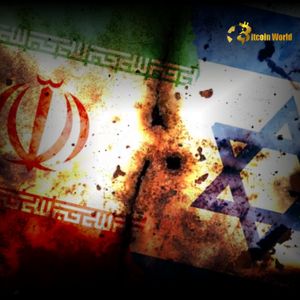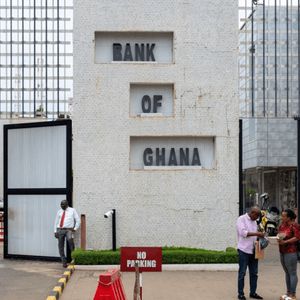Urgent Alert Iran Israel Conflict Escalates Threatening Stability
8 min read
BitcoinWorld Urgent Alert Iran Israel Conflict Escalates Threatening Stability In the unpredictable world of global affairs, geopolitical risks can emerge rapidly, sending ripples across continents and markets, including the cryptocurrency space. A recent development out of the Middle East highlights just such a potential flashpoint: escalating tensions between Iran and Israel, with significant accusations leveled against the United States. Understanding the Immediate Iran Israel Conflict Spark Reports have surfaced indicating a sharp increase in rhetoric and actions between long-standing adversaries, Iran and Israel. According to Iran Observer, a source with a substantial following on social media, Iran’s Armed Forces have issued a stark warning to Israel. The message is clear: Israel should prepare for severe consequences and a strong retaliation. This warning follows earlier reports, including one from AP News, suggesting that Israel had conducted strikes and specifically targeted Iranian nuclear sites. While details surrounding the alleged Israeli actions and Iran’s potential response remain fluid, the direct targeting of sensitive facilities, if confirmed, marks a significant escalation in the shadow war that has long characterized the Iran Israel conflict . Adding another layer of complexity and tension to this already volatile situation is Iran’s direct accusation against the United States. The statement from Iran’s Armed Forces explicitly claims that the United States is fully cooperating with Israel. This accusation is weighty, as it directly implicates a major global power and suggests a potential widening of the conflict beyond the two primary regional actors. Deep Dive into US Iran Relations and Historical Context The relationship between the United States and Iran has been fraught with tension for decades, marked by periods of diplomatic engagement, sanctions, and proxy conflicts. Understanding this history is crucial to grasping the current dynamics and Iran’s accusation of US cooperation with Israel. Key aspects of US Iran relations include: The 1979 Islamic Revolution: This event fundamentally altered the relationship, turning a close ally into a hostile adversary. Hostage Crisis: The seizure of the US embassy in Tehran and the subsequent hostage crisis cemented mutual distrust. Nuclear Program Concerns: US and international concerns over Iran’s nuclear ambitions have been a central point of contention for years, leading to sanctions and the Joint Comprehensive Plan of Action (JCPOA), or Iran nuclear deal, which the US later withdrew from under the Trump administration. Regional Rivalry: The US is a strong ally of Israel and several Arab states that view Iran as a primary threat in the Middle East. This alignment naturally puts the US at odds with Iran’s regional ambitions and its network of proxy forces. Military Presence: The significant US military presence in the Middle East is often viewed by Iran as a direct threat to its security and sovereignty. Given this backdrop, Iran’s accusation of US cooperation with Israel, while perhaps intended for political messaging, reflects the deep-seated animosity and suspicion that defines US Iran relations . The US provides substantial military and diplomatic support to Israel, and it is widely understood that there is close intelligence sharing and strategic coordination between the two countries, particularly regarding threats emanating from Iran. Why Geopolitical Tension Matters for Global Stability When tensions flare in a region as strategically vital as the Middle East, the impact extends far beyond the immediate borders of the involved nations. Geopolitical tension in this area is particularly significant due to: Energy Supply: The Middle East is a major source of global oil and gas. Conflict here can disrupt supply routes (like the Strait of Hormuz) and lead to significant price spikes, impacting economies worldwide. Global Alliances: The region involves complex alliances and rivalries that draw in major global powers (US, Russia, China), increasing the risk of a wider international crisis. Terrorism and Extremism: Instability can create vacuums or opportunities for extremist groups to flourish, posing security threats globally. Economic Interconnectedness: In an increasingly globalized economy, conflict anywhere can affect supply chains, trade, and investor confidence everywhere. The current escalation in the Iran Israel conflict , coupled with the accusation against the US, heightens global anxieties about the potential for a miscalculation leading to a larger, more destructive conflict. This inherent uncertainty is a key characteristic of significant geopolitical tension . Navigating the Middle East Conflict: Potential Scenarios The situation in the Middle East conflict involving Iran and Israel could evolve along several paths, each with different implications: Scenario 1: De-escalation Intense rhetoric cools down. Back-channel diplomacy or mediation efforts (possibly involving other regional or global powers) succeed in lowering tensions. Actions remain limited to the ‘shadow war’ realm (cyberattacks, proxy skirmishes) without direct state-on-state military engagement. This scenario relies heavily on restraint from all parties and effective communication channels. Scenario 2: Limited Escalation Tit-for-tat strikes continue, potentially involving more significant military targets or infrastructure. Proxy groups linked to Iran in Lebanon, Syria, Iraq, or Yemen increase attacks on Israeli or US interests in the region. Naval incidents in the Persian Gulf or Red Sea increase. Conflict remains primarily regional, without direct attacks on the homelands of the US or Iran (beyond proxy actions). Scenario 3: Significant Escalation (Wider Conflict) Direct military confrontation between Iran and Israel. US forces in the region are directly targeted or drawn into combat. Wider regional powers become involved. Potential disruption of major shipping lanes. This scenario carries the highest risk of widespread destruction and significant global market impact . The path taken will depend on numerous factors, including political will, military capabilities, and the potential for miscalculation under pressure. The accusation against the US suggests Iran views this not just as an Israel-Iran issue, but one involving the primary global power allied with its adversary, increasing the stakes within the broader Middle East conflict . Assessing the Global Market Impact One of the most immediate and tangible effects of rising geopolitical tension , particularly in the Middle East, is felt in global financial markets. Investors typically react to uncertainty by moving towards perceived safer assets and away from riskier ones. How might this specific situation impact markets? Oil Prices: The Middle East is central to global oil supply. Any threat to production or transport (like the Strait of Hormuz) can cause prices to surge. Escalation fears often build a ‘risk premium’ into oil prices, making them higher than market fundamentals alone might suggest. A wider conflict could lead to significant and sustained oil price shocks, impacting inflation and economic growth globally. Stock Markets: Increased volatility is common during periods of heightened geopolitical risk. Indices may decline as investors adopt a ‘risk-off’ stance, selling equities and moving into assets like government bonds. Sectors directly exposed to the region (e.g., energy, defense) or sensitive to global economic slowdowns may see significant movements. Safe-Haven Assets: Traditional safe havens like gold and potentially the US dollar may see increased demand, driving up their prices. Bitcoin’s role as a safe haven is debated, but it has shown potential to act as one during certain periods of global uncertainty, independent of traditional financial systems. The severity of the global market impact is directly correlated with the perceived likelihood and potential scale of escalation in the Iran Israel conflict . Cryptocurrency Market Impact: A Unique Perspective For those interested in digital assets, the question arises: how does geopolitical tension , specifically the potential for an expanded Middle East conflict involving the US and Iran, affect the cryptocurrency market? The relationship is complex and not always straightforward, but several factors are at play: Bitcoin as ‘Digital Gold’: The narrative that Bitcoin is a store of value akin to gold, especially during times of economic or political instability, gains traction. As traditional markets show volatility and potential downturns, some investors might look to Bitcoin as an uncorrelated asset or a hedge against traditional financial system risks. However, Bitcoin is still a relatively young and volatile asset class, and its reaction can also be influenced by broader market sentiment and liquidity. Increased Volatility: Geopolitical shocks tend to increase volatility across all asset classes, and cryptocurrencies are no exception. Sudden news developments can lead to rapid price swings as traders react to perceived risks or opportunities. Capital Flows: In regions directly affected by conflict or instability, there might be an increased interest in cryptocurrencies as a way to preserve wealth or facilitate cross-border transactions if traditional banking systems are disrupted or under scrutiny. Conversely, a global ‘risk-off’ move could see investors liquidate crypto holdings alongside other assets to raise cash. Regulatory Uncertainty: Heightened geopolitical tensions can sometimes lead to increased scrutiny on financial flows, potentially impacting cryptocurrency exchanges and transactions as governments look to prevent illicit financing or circumvention of sanctions. While cryptocurrencies exist outside traditional state-controlled financial systems, they are not immune to global events. The scale of the global market impact from the Iran Israel conflict and US Iran relations will undoubtedly influence investor sentiment and capital flows within the crypto ecosystem. Challenges and Uncertainties Ahead Predicting the outcome of the current geopolitical tension in the Middle East is challenging due to several factors: Information Opacity: Details about military actions and political intentions are often unclear or subject to propaganda. Multiple Actors: The involvement of state actors (Iran, Israel, US) and non-state proxies adds layers of complexity. Risk of Miscalculation: In high-tension situations, unintended actions or misinterpretations can trigger rapid escalation. Domestic Politics: Internal political dynamics in each country can influence decision-making. The accusation of full US cooperation by Iran highlights the perception that this is not just a bilateral issue, but one involving the broader strategic competition in the region and the intricate web of US Iran relations . This perception itself can fuel further tension and shape responses. Actionable Insights in Times of Geopolitical Risk While predicting market movements or the course of conflict is impossible, individuals and market participants can focus on managing their response to the uncertainty created by events like the escalating Iran Israel conflict and its potential global market impact . Stay Informed: Follow reliable news sources to understand developments, but be critical of information, especially during times of conflict. Understand Risk: Recognize that geopolitical events introduce significant volatility and risk into markets. Review Portfolio: Consider whether your investment portfolio aligns with your risk tolerance, especially in a volatile environment. Diversification across different asset classes and geographies is a common strategy to mitigate risk (Note: This is general information, not financial advice). Avoid Panic Reactions: Emotional decision-making during periods of high tension often leads to poor outcomes. Focus on Long-Term Strategy: Short-term geopolitical shocks can be significant, but long-term investment strategies should ideally be based on fundamental analysis and personal financial goals. The interplay between geopolitical tension , US Iran relations , and the dynamics of the Middle East conflict underscores the interconnectedness of global events and their potential to influence even relatively new markets like cryptocurrency. Summary: Navigating a Volatile Landscape The recent warnings from Iran’s Armed Forces to Israel, coupled with the direct accusation of US cooperation, signal a dangerous uptick in the long-standing Iran Israel conflict . This development is not isolated; it is deeply rooted in complex US Iran relations and contributes to the broader instability characteristic of the Middle East conflict . Such heightened geopolitical tension carries significant risks, not least of which is a potentially severe global market impact . From oil prices and stock market volatility to the performance and perception of assets like Bitcoin, the ripples of conflict in this critical region are felt worldwide. As the situation remains fluid and uncertain, understanding the historical context, potential scenarios, and interconnectedness of global events is crucial for anyone seeking to navigate the complexities of today’s world and its financial markets. The coming days and weeks will be critical in determining whether de-escalation or further confrontation prevails. To learn more about the latest geopolitical trends and their potential impact on the crypto market, explore our article on key developments shaping cryptocurrency institutional adoption. This post Urgent Alert Iran Israel Conflict Escalates Threatening Stability first appeared on BitcoinWorld and is written by Editorial Team

Source: Bitcoin World



